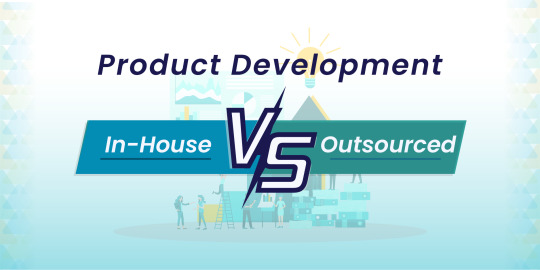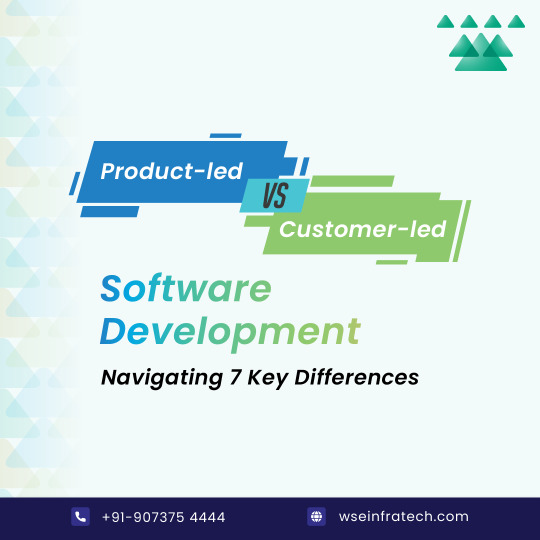#software development planning
Explore tagged Tumblr posts
Text
Outsourcing vs in-house software development
Software Development is rapidly shaping the future of businesses by empowering them with technological efficiencies at every step. The tech-driven industry relies on software applications to simplify everyday operations, calling for organizations to strengthen their development dynamics. Two approaches—in-house and outsourcing—dominate software cycles. Both approaches have their perks and striking the right balance is critical to ensure a strategic deployment. Let’s dive deeper into in-house and outsourced software development to understand which is viable for your organization.

#Product-Led Development Strategy#Software Development#Software Development Strategy#Product Development#software development planning
0 notes
Text
Random question for the coding folks...
If I were to just straight up like... offer free programming tutoring, are there folks out on Tumblr who would be interested?
#coding#codeblr#programming#web development#software development#learn to code#Javascript#I am planning to restart my video series on learning Javascript#but am also trying to find new avenues for helping to educate new people in the field#bc I have realized that's very important to me#and the coding boot camp I've been tutoring for is uh. sort of falling apart
277 notes
·
View notes
Text
I love developing websites that no one but me will ever see <3
#i talk#I am making a website to help me keep track of story details and its so fun to develop#I'm making character pages rn and I need to start writing stuff about the world but that meands I have to make up names for everything#I am using an actual note compiling software called Obsidian for my writing but I am just jotting down ideas as they come to me#and I am not cleaning them up in case there's anything I will need later down the line#so to avoid trawling through dead and half finished ideas everything is getting refined into tha webbed site yippee!!#unfortunately this does mean I'd have to update the site whenever I make major changes to the characters and story#but I am soon getting to the point of story planning where big sweeping changes won't really be coming into play
3 notes
·
View notes
Text
How Financial Education Platforms Can Empower You ?

In an increasingly complicated financial market, knowledge is power. financial education platforms, powered by innovative fintech software like Xettle Technologies, offer a pathway to empowerment by providing individuals with the knowledge, skills, and resources they need to take control of their financial futures. From basic budgeting to advanced investing strategies, these platforms empower users to make informed decisions, achieve their financial goals, and build a solid foundation for long-term financial success.
Access to Comprehensive Learning Resources: Financial education platforms offer access to a wealth of comprehensive learning resources, including articles, videos, webinars, and interactive tools, covering a wide range of topics relevant to personal finance, investing, and entrepreneurship. Whether you're a beginner looking to build a basic understanding of financial concepts or an experienced investor seeking to expand your knowledge, these platforms provide resources tailored to your needs and skill level.
Xettle Technologies, a leader in fintech software, has developed a robust financial education platform designed to empower users with the knowledge and skills they need to succeed financially. Through its intuitive interface and user-friendly design, Xettle's platform provides access to a curated library of educational resources, curated by industry experts and thought leaders, covering everything from budgeting and saving to investing and retirement planning.
Personalized Learning Experiences: One of the key benefits of financial education platforms is their ability to deliver personalized learning experiences tailored to each user's unique needs, preferences, and learning style. Through advanced algorithms and machine learning, these platforms analyze user data and behavior to deliver customized content recommendations, learning paths, and interactive experiences that engage and motivate users to learn.
Xettle Technologies leverages its expertise in fintech software to create personalized learning experiences for users of its financial education platform. By analyzing user interactions and preferences, Xettle's platform delivers tailored content recommendations and learning paths that align with each user's financial goals and objectives. Whether it's through interactive quizzes, simulations, or live webinars, Xettle's platform provides users with the tools they need to master their finances and achieve their financial goals.
Promoting Financial Inclusion: Financial education platforms play a crucial role in promoting financial inclusion by democratizing access to financial knowledge and resources. By providing accessible and affordable education, these platforms empower individuals from all walks of life, regardless of their background or financial situation, to participate in the financial system and make informed decisions about their money.
Xettle Technologies is committed to promoting financial inclusion through its financial education platform. By leveraging its expertise in fintech software, Xettle has developed a platform that is accessible to users across the globe, regardless of their socioeconomic status or geographic location. Through partnerships with organizations and institutions, Xettle is working to ensure that its platform reaches those who need it most, helping to bridge the financial literacy gap and promote economic empowerment.
Empowering Financial Advisors: Financial education platforms are not only empowering individuals but also financial advisors. These platforms provide advisors with a wealth of educational resources and tools that they can use to educate and empower their clients. By arming clients with the knowledge they need to make informed decisions, advisors can build stronger relationships, provide more value-added services, and help clients achieve their financial goals.
Xettle Technologies recognizes the important role that financial advisors play in promoting financial literacy and empowering clients. That's why Xettle's financial education platform includes features specifically designed for financial advisors, such as customizable content libraries, client engagement tools, and analytics dashboards. Through its platform, Xettle is helping advisors educate and empower their clients, driving better outcomes for all.
Conclusion: Financial education platforms are powerful tools for empowering individuals to take control of their financial futures. By providing access to comprehensive learning resources, delivering personalized learning experiences, promoting financial inclusion, and empowering financial advisors, these platforms are transforming the way people think about and interact with money. As these platforms continue to evolve and expand, they have the potential to revolutionize financial education and empower millions of individuals around the world to achieve financial freedom and security.
#Financial Education#Planning#Software Development#Fintech#artists on tumblr#ecommerce#xettle technologies
5 notes
·
View notes
Text
goodness, i think i'm gonna have to make a post about project 2025.
#maddie speaks#us politics#politics#project 2025#txt#like an overview of the entire thing which will be a bit difficult since it's over 900 pages#and this is really serious shit but i'm not seeing much awareness of it here on tumblr so#i'm gonna make a summary with as much info as i can muster#honestly i'm gonna need an exit plan if shit hits the fan here in the u.s.#england is on the top of the list to go to rn. but i'm 18 so i have no clue how i'm gonna make enough money to move out if i need to#i'm aiming to be a software developer which seems to make a real good amount of money. so.#hopefully it all works out in the end.
7 notes
·
View notes
Text
I will continue being gone for a few days, sadly my original al plan of releasing the newest chapter of The Consequence Of Imagination's Fear has also been delayed. My apologies
Can't go into detail because its hush hush not-legally-mentionable stuff but today is my fifth 12 hour no-break work day. I'm also packing to move too in a fortnight (which is a Big Yahoo!! Yippee!! I'll finally have access to a kitchen!! And no more mold others keep growing!!! So exciting!!!)
#syncrovoid.txt#delete later#OKAY SO! this makes it sound like i have a super important job but really we are understaffed and ive barely worked there a year now#graduated college a few years early 'cause i finished high school early (kinda? it's complicated)#now i am in a position where i am in the role of a whole Quality Assurance team (testing and write ups)#a Task Manager/Planner#Software Developer and maybe engineer? not sure the differences. lots of planning and programming and debugging ect ect#plus managing the coworker that messed up and doing his stuff because it just isnt good enough. which i WILL put in my end day notes#our team is like 4 people lol. we severely need more because rhe art department has like 10 people??#crunch time is.. so rough..#its weirdddddd thinking about this job since its like i did a speedrun into a high expectations job BUT in my defense i was hired before#i graduated. and like SURE my graduating class had literally 3 people so like there was a 86%-ish drop out rate??#did a four year course in 2 BY ACCIDENT!! i picked it on a whim. but haha i was picked to give advice and a breakdown on the course so it#could be reworked into a 3 year course (with teachers that dont tell you to learn everything yourself) so that was neat#im rambling again but i have silly little guy privileges and a whole lot of thoughts haha#anywho i am SO hyped to move!! I'll finally get away from the creepy guy upstairs (i could rant for days about him but he is 0/10 the worst)#it will be so cool having access to a kitchen!! and literally anything more than 1 singular room#(it isnt as bad as it sounds i just have a weird life. many strange happenings and phenomenons)#<- fun fact about me! because why not? no one knows where i came from and i dont 100% know if my birthday is my birthday#i just kinda. exist. @:P#i mean technically i was found somewhere and donated to some folks (they called some different people and whoever got there first got me)#but still i think it is very silly! i have no ties to a past not my lived one! i exist as a singularity!#anywho dont think about it too hard like i guess technically ive been orphaned like twice but shhhhhhhh#wow. i am so sleep deprived. i am so so sorry to anyone who may read this#i promise im normal#@:|
8 notes
·
View notes
Note
im nosy what do you do for work beloved? <3

#answered#I haven’t used this pic in soooo long meu deus!#I work at a tech consulting company. sometimes im consulting…sometimes im software developing👩🏽💻 putergenius isn’t just my name that’s lif#haven’t done a life update in forever. not in school (phew…the drama.) working full time at a place I interned at#and planning a big move soon…it’s getting real over here…im GROWN. lmaoo
2 notes
·
View notes
Text
Why Manufacturers Grow Faster With ERP Software
Introduction:
In the ever-evolving landscape of manufacturing, staying ahead of the competition requires more than just producing quality products. It demands efficient processes, streamlined operations, and the ability to adapt to changing market dynamics. This is where ERP (Enterprise Resource Planning) software steps in as a game-changer for manufacturers. In this blog, we'll delve into the reasons why manufacturers experience accelerated growth with ERP software and explore the significance of key ERP modules designed for the manufacturing industry. Let's unlock the potential of the best manufacturing ERP software and understand how it propels growth.

Understanding ERP Modules for Manufacturing Industry:
1. Supply Chain Management:
Effective supply chain management is at the core of manufacturing success. ERP modules for manufacturing industry streamline supply chain processes by providing real-time visibility into inventory levels, order status, and supplier relationships. Manufacturers can optimize procurement, reduce lead times, and enhance overall supply chain efficiency.
2. Production Planning and Scheduling:
Efficient production planning and scheduling are essential for meeting customer demands and minimizing downtime. ERP software enables manufacturers to create realistic production schedules, allocate resources effectively, and adjust plans dynamically in response to changing demand. This results in improved production efficiency and timely delivery of products.
3. Quality Control:
Maintaining consistent product quality is a non-negotiable aspect of manufacturing. ERP modules for quality control allow manufacturers to monitor production processes in real-time, track defects, and enforce adherence to quality standards. This not only ensures the delivery of high-quality products but also reduces waste and rework costs.
4. Inventory Management:
Managing inventory effectively is a delicate balancing act. ERP software provides manufacturers with tools to optimize inventory levels, track stock movements, and minimize carrying costs. With real-time insights into inventory status, manufacturers can prevent stockouts, reduce excess inventory, and enhance overall supply chain efficiency.
Manufacturing Enterprise Resource Planning Software: Unleashing Growth Potential
1. Streamlined Communication:
Effective communication is crucial for seamless operations. Manufacturing ERP software centralizes communication channels, allowing different departments to share information in real-time. This not only reduces the risk of miscommunication but also fosters collaboration among teams, leading to improved overall efficiency.
2. Data-Driven Decision-Making:
In the fast-paced world of manufacturing, decisions need to be swift and well-informed. ERP software aggregates data from various business processes, providing manufacturers with actionable insights. Data-driven decision-making becomes a reality, enabling manufacturers to respond proactively to market trends, customer demands, and operational challenges.
3. Scalability for Growth:
Growth is a constant objective for manufacturers. The best ERP for the manufacturing industry is designed with scalability in mind. As businesses expand, ERP systems can easily accommodate increased data volume, users, and additional functionalities. This scalability ensures that the ERP solution grows with the manufacturing enterprise, supporting its evolving needs.
4. Enhanced Customer Relationship Management (CRM):
Customer satisfaction is a key driver of growth. Manufacturing ERP software often includes CRM modules that allow manufacturers to manage customer relationships effectively. From order processing to after-sales support, ERP systems help manufacturers deliver exceptional customer experiences, fostering customer loyalty and driving growth.
Best ERP for Manufacturing Industry: Navigating Toward Success
1. Tailored Solutions for Industry Needs:
The best ERP for the manufacturing industry goes beyond generic solutions. It offers modules specifically designed to address the unique challenges and requirements of manufacturing operations. From managing complex bills of materials to handling production workflows, the best ERP software is tailored to the intricacies of the manufacturing sector.
2. Real-Time Reporting and Analytics:
Timely and accurate reporting is a cornerstone of effective decision-making. The best manufacturing ERP software provides robust reporting and analytics capabilities, allowing manufacturers to generate custom reports, track key performance indicators (KPIs), and gain insights into operational efficiency. This empowers manufacturers to identify areas for improvement and implement strategic changes.
3. Compliance and Regulatory Support:
Compliance with industry regulations is non-negotiable for manufacturers. The best ERP solutions for manufacturing industry include features that help businesses adhere to regulatory requirements. This not only ensures legal compliance but also mitigates the risk of penalties and reputational damage.
4. User-Friendly Interfaces:
User adoption is critical for the success of any ERP implementation. The best ERP modules for manufacturing industry prioritize user-friendly interfaces, making it easier for employees to navigate the system and perform their tasks. Intuitive interfaces contribute to smoother onboarding processes and overall system usability.
Conclusion:
In the fast-paced world of manufacturing, growth is not just a goal; it's a necessity. ERP software emerges as a strategic ally for manufacturers, propelling them toward accelerated growth by optimizing processes, fostering efficiency, and enabling informed decision-making. From the essential ERP modules for the manufacturing industry to the features that make the best ERP solutions stand out, manufacturers can unlock their full growth potential with the right ERP software. Embrace the power of ERP, and witness your manufacturing enterprise soar to new heights of success.
#ERP Modules for Manufacturing Industry#Manufacturing Enterprise Resource Planning Software#Best Manufacturing ERP Software#Best ERP for Manufacturing Industry#ERP Software for Manufacturing Industry#ERP System for Manufacturing Industry#ERP for Software Development Company#ERP Solutions for Manufacturing#India
6 notes
·
View notes
Text

THE FINANCIAL JOURNAL
BREAKING
Prince Drops Major Infrastructure Intel
Last night, at Lower Manhattan’s high-end restaurant Torrisi, independent presidential candidate and hedge fund billionaire Michael Prince spilled a huge scoop on his potential infrastructure plan. If he takes the White House, Prince plans to declassify breakthrough self-healing concrete, which was recently seized by the Department of Defense for reasons unclear (the representative we reached out to declined to comment for this article).
Prince spoke fondly and optimistically about the technology with top-level New York government officials and one high-profile athlete (all of whom asked to be anonymous). He said to the group, “You beat the brush and look and look, and you finally find something that’ll ensure our future. Some real leave-our-children-with-something-they-can-count-on stuff, only to have Washington goons and their New York State and Southern District hooligans swoop in and make it disappear.”
Someone as calculated and image-conscious as Prince doesn’t let a comment like this just slip out in public by accident. By making such a bold stake in infrastructure, a key issue for this upcoming election cycle, Prince is letting it be known that he is going all in as a candidate and is doing so on his own terms. He plans to use his engineering experience and business savviness to work through country-wide issues.
While this sounds great in theory, of course, getting through Congress gridlock can be much more challenging. When asked about how he plans to work with Democrats and Republicans in the Senate and House, Prince responded, “One of the reasons Michael Prince Capital has had such great success and impact over the years is because […] as a one person rules all organization. I value the input of every single one of my […] staff, floor traders… even our front desk assistants. I’m highly aware that change and progress are team sports, and I am more than ready to play ball.”
As for how he will execute such a […], again, we will simply […] that coming off of a strong performance from his TV […] last month, this is exactly the kind of development Prince needs to keep his momentum up and […] to set himself apart from the pack of 2024 candidates. Per the Financial Journal’s […] poll, Prince is still only polling at 24 percent, but that is a […], and there should […] his TV […].
#billions#7x08#mike prince#mike dimonda#interestingly the “quote” from prince in the second paragraph isn't a word-for-word match with how he actually said it#“he plans to use his engineering experience” WHAT engineering experience lmao. software development doesn't count here#and of course lol and lmao at “i value the input of all my employees”
2 notes
·
View notes
Text
Catching up
My health issue appears to be resolved, though I am avoiding strenuous exercise for the time being.
Today I pushed all my MonkeyWrench changes to the public repo at GitHub, including the test app.
Next up: assess how well MonkeyWrench loads various test models compared to the standard jme3-plugins loaders in the JMonkeyEngine game engine.
#wip#open source#github#software development#accomplishments#3d model#3d graphics#game engine#software testing#future plans#coding
4 notes
·
View notes
Text
Product-led vs Customer-led Strategy in Product Development Planning Know how to achieve your software development goals by implementing both customer led and product led approaches Know More : https://wseinfratech.com/trivia/vital-differences-between-productled-and-customerled-software-development

#Product-Led Development Strategy#Software Development#Software Development Strategy#Product Development#software development planning
0 notes
Text
Cloud-First and Hybrid ERP Deployments: The Future of Scalable Business Operations in India

In today’s fast-paced digital landscape, businesses are rapidly embracing modern enterprise technologies to stay competitive and agile. One of the most transformative shifts in recent years is the move toward Cloud-First and Hybrid ERP deployments. This evolution in ERP implementation is not just a trend — it’s a strategic imperative for businesses aiming for growth, scalability, and efficiency.
Why Cloud-First ERP is Becoming the New Standard
Cloud-First ERP refers to an approach where companies prioritize deploying their ERP systems on cloud infrastructure from the outset. This model allows businesses to:
Scale resources on-demand without heavy hardware investments
Access real-time data from anywhere, enabling faster decision-making
Reduce IT maintenance costs, as vendors handle updates and security patches
Improve disaster recovery and data backup capabilities
In India, where small and mid-sized enterprises (SMEs) are rapidly digitalizing, a Cloud-First approach enables these businesses to gain enterprise-level functionality at a fraction of the cost.
Understanding Hybrid ERP: A Flexible Middle Ground
While cloud ERP offers many advantages, some organizations — especially those in highly regulated industries — still require on-premise control for specific operations. Hybrid ERP solutions allow companies to:
Keep sensitive modules on-premise while leveraging the cloud for others
Integrate legacy systems with newer cloud technologies
Maintain compliance with local data regulations
Enhance operational flexibility across multi-location enterprises
This makes Hybrid ERP particularly attractive to large Indian manufacturing firms and global exporters, who often need to balance local compliance with global connectivity.
The Rise of Hybrid ERP in the Manufacturing Sector
The Best ERP Software for Manufacturing Industry is increasingly taking a hybrid route to accommodate real-time shop floor monitoring, supply chain optimization, and smart analytics. Hybrid deployments give manufacturers the control they need on the ground while supporting strategic insights through cloud-powered dashboards.
Indian manufacturers benefit from:
Predictive analytics for inventory planning
Cloud-enabled supplier collaboration
IoT integrations for real-time data collection
When integrated effectively, Hybrid ERP creates a seamless bridge between production and planning, supporting lean operations and reducing waste.
Choosing the Right Partner for Cloud and Hybrid ERP
If you’re exploring digital transformation in India, working with the best ERP software company India has to offer is crucial. Look for partners with:
A strong track record in cloud migrations
Deep domain expertise across industries
Scalable deployment options (public, private, or hybrid)
Robust post-implementation support and training
An experienced ERP provider ensures minimal disruption during migration and helps align ERP functionality with your unique business processes.
Final Thoughts: Smart ERP Deployment is a Strategic Advantage
The shift to Cloud-First and Hybrid ERP is not just about technology — it’s about future-proofing your business. Indian enterprises that embrace these models are better equipped to innovate, respond to market shifts, and scale rapidly.
Whether you’re a fast-growing SME or a large manufacturer, investing in the Best ERP Solutions in India can accelerate your operational efficiency and drive long-term value.
0 notes
Text
Scrum, Actually: Fixing the Daily Catch-Up
We called it a “daily catch-up.”It felt more like a group panic disguised as a status update.Nobody knew why we were doing it—just that we had to. Then I read the Scrum Guide.Turns out, we were doing it wrong. Here’s how we fixed it. The first time I experienced a Daily Scrum, I thought it was a job interview. Every day. For the same job. That I already had. At 9:30 AM, we’d gather like…
#agile#agile coaching#Agile Practices#agile transformation#collaboration#Daily Scrum#engineering culture#Planning#Please Don’t Fire Me Theatre#Schrödinger’s Blocker#scrum#scrum master#software development#Stand-up Meetings#Team Culture#Tech Teams#trust
0 notes
Text
https://insteptechnologies.com/service/crm-and-erp-development-services/
#crm development#erp software development#custom crm solutions#enterprise software#business automation tools#sales automation#workflow management#resource planning#crm integration#erp systems
0 notes
Text
How Are Fintech Startups Scaling Across Borders?

The rise of fintech startups has disrupted traditional financial models, offering smarter, faster, and more inclusive solutions to consumers and businesses worldwide. As the fintech global landscape evolves, one of the most intriguing trends is the rapid expansion of fintech startups beyond their domestic markets. With technology as their backbone and innovation at their core, these startups are scaling across borders by leveraging digital infrastructure, regulatory flexibility, customer-centric models, and strategic partnerships.
The question isn’t just whether fintech startups can scale globally—it’s how they’re doing it successfully. Here's a closer look at the strategies, challenges, and growth enablers driving the cross-border expansion of fintech services.
1. Cloud Infrastructure and API Integration
One of the fundamental enablers of global scalability for fintech startups is the use of cloud-based systems and Application Programming Interfaces (APIs). These technologies allow fintech platforms to quickly deploy services across countries without building separate physical infrastructure.
For example, cloud-native architecture makes it easier to handle customer data securely and efficiently from different regions, while APIs enable integration with local banking systems, payment gateways, and regulatory reporting tools. These technical advantages empower fintech firms to launch and scale fintech services in new markets with minimal friction.
2. Understanding Local Compliance and Regulation
Expanding across borders isn't just about technology—it also requires a deep understanding of regulatory environments. Each country has unique financial laws, data protection standards, and compliance requirements. Fintech startups that succeed globally are those that invest in localized legal teams or RegTech solutions to ensure they meet all relevant regulatory expectations.
Moreover, global regulators are increasingly supportive of fintech innovation. Many countries have established fintech sandboxes, regulatory hubs, and open banking frameworks to facilitate the entry of foreign players. This regulatory openness has fueled the rise of fintech global, providing startups a chance to test, adapt, and thrive in foreign markets with limited risk.
3. Localization of Services
To appeal to users in different regions, fintech startups must tailor their services to meet local needs, preferences, and languages. This goes beyond just translating an app’s interface—it involves adapting the product offering to align with cultural norms, financial behaviors, and user expectations.
For instance, in emerging markets where mobile penetration is high but credit card access is low, fintech startups may focus on mobile wallets and micro-lending instead of traditional digital banking. By aligning fintech services with local user demands, startups enhance adoption and build trust in new markets.
4. Digital-First and Mobile-Driven Models
Another driver of cross-border success is the mobile-first approach adopted by most fintech startups. In both developed and developing markets, mobile banking and digital payments have gained immense popularity. Startups that prioritize mobile usability and digital onboarding can easily replicate their models in new geographies with high smartphone usage.
This digital-first model eliminates the need for physical branches, allowing startups to scale faster and reach users in remote or underserved areas. The result is a more inclusive fintech global ecosystem where anyone with a smartphone and internet access can benefit from modern financial tools.
5. Partnerships and Strategic Alliances
Forging partnerships with local banks, telecom providers, e-commerce platforms, and government institutions is a proven strategy for scaling across borders. These partnerships offer instant access to large user bases, existing payment infrastructures, and valuable market insights.
Startups also collaborate with global fintech accelerators and venture capital firms that provide mentorship, funding, and market access. Strategic alliances enable startups to navigate unfamiliar markets more confidently and scale their fintech services effectively.
6. Cross-Border Payment Solutions
One of the core areas where fintech startups are excelling globally is cross-border payments. Traditional international transfers are expensive, slow, and inefficient. Fintech solutions that use blockchain, decentralized finance (DeFi), and real-time payment rails are transforming the global remittance and international trade landscape.
By offering transparent, fast, and low-cost cross-border transactions, fintech startups are solving a massive pain point for millions of migrants, freelancers, and international businesses. This innovation is a key pillar of the expanding fintech global ecosystem.
7. The Role of Xettle Technologies
A notable example of a fintech company pushing boundaries is Xettle Technologies. With a strong focus on delivering scalable, AI-driven, and cloud-based fintech services, Xettle Technologies has embraced global standards while adapting to local market dynamics. Their approach to seamless integration, security-first infrastructure, and user-centric innovation allows them to confidently scale across borders and contribute to financial inclusion worldwide.
Conclusion
Scaling across borders is no longer a challenge reserved for large multinational corporations. Fintech startups are breaking barriers with digital innovation, strategic localization, and regulatory intelligence. As the fintech global movement accelerates, startups are seizing the opportunity to redefine financial services for a worldwide audience.
From cloud technology to cross-border payments and strategic alliances, the future of global fintech is being shaped by startups that think globally but act locally. With companies like Xettle Technologies leading by example, it's clear that the next wave of financial innovation knows no borders.
0 notes
Text
The Benefits of Cloud Based CRM Systems for Small Businesses

In an era defined by agility, data, and connectivity, small businesses are under increasing pressure to compete not only with each other but with larger, resource-rich enterprises. To remain competitive, these businesses must harness the same tools that power the success of industry giants – chief among them, Customer Relationship Management (CRM) systems. Specifically, cloud-based CRM platforms offer a level playing field for small businesses by democratizing access to enterprise-grade technology without the associated infrastructure costs.
This in-depth blog will explore how cloud-based CRM systems revolutionize small business operations, offering them scalability, flexibility, and a decisive competitive edge. We will examine the profound benefits these systems provide and how partnering with a CRM Development Company, CRM Software Company, or even an ERP Development Company can accelerate growth. Cloud technology is no longer a luxury – it is a necessity.
Understanding Cloud-Based CRM: A Paradigm Shift
At its core, a CRM system helps businesses manage interactions with current and prospective customers. But when deployed on the cloud, its functionality expands exponentially. Unlike on-premises systems that require hardware, constant maintenance, and in-house IT support, cloud-based CRM solutions are hosted online, accessible from any location, and continually updated by the provider.
Cloud-based CRM solutions offer a suite of powerful features – contact management, sales pipeline tracking, automated marketing, analytics, and customer support tools – all integrated into a single platform. These tools empower small businesses to deliver personalized experiences, nurture leads, and streamline operations.
Accessibility and Remote Collaboration
The global shift towards hybrid and remote work has underscored the need for accessible, cloud-native tools. A cloud-based CRM allows teams to collaborate in real-time from anywhere in the world. Whether it’s the sales team accessing lead information on the road or customer support resolving issues from home, cloud CRM ensures continuity and efficiency.
Cloud Consulting Companies play a crucial role in setting up seamless remote access protocols, data synchronization, and device compatibility, ensuring that employees remain productive regardless of location.
Cost-Effectiveness and Scalability
One of the most compelling advantages for small businesses is cost efficiency. On-premise CRM systems demand significant upfront investment in servers, software licenses, and IT personnel. In contrast, cloud-based CRMs operate on a subscription model, minimizing capital expenditure and converting it into predictable operating costs.
Moreover, these systems are inherently scalable. Whether you have ten or ten thousand customers, cloud CRM platforms can expand or contract according to your business needs. A reputable CRM Software Company can guide your business through scalability planning to accommodate future growth.
Real-Time Data and Enhanced Decision-Making
Data is the new oil, and real-time data is the refinery. Cloud-based CRM systems provide instantaneous access to customer insights, performance metrics, and sales forecasts. This empowers small business owners and managers to make informed, timely decisions.
Cloud systems also support advanced analytics and AI-driven recommendations. Partnering with an ERP Software Company can further integrate data streams from inventory, finance, and operations, creating a 360-degree view of your business landscape.
Automation of Routine Tasks
Manual data entry, follow-up reminders, and email campaigns can consume valuable time. Cloud-based CRMs automate these tasks, freeing staff to focus on strategic growth activities. From automatic lead nurturing workflows to personalized follow-up emails, these systems work silently in the background, enhancing productivity.
Working with a CRM Development Company ensures that your automation sequences are customized to your specific business needs, maximizing efficiency and personalization.
Seamless Integration with Existing Tools
Modern small businesses rely on a suite of digital tools from email marketing platforms and accounting software to e-commerce systems and customer support channels. Cloud-based CRM systems are built for integration. Through APIs and plug-and-play modules, these platforms unify disparate tools into one coherent ecosystem.
Whether you’re integrating with QuickBooks, Mailchimp, Shopify, or Slack, a Cloud Consulting Company or ERP Development Company can ensure smooth interoperability.
Enhanced Security and Compliance
Data security remains a paramount concern, especially for businesses handling sensitive customer information. Reputable CRM Software Companies build cloud-based platforms with enterprise-grade security measures including end-to-end encryption, role-based access controls, multi-factor authentication, and regular security audits.
Additionally, these systems are designed to comply with global data protection regulations such as GDPR and CCPA. A Cloud Consulting Company can offer invaluable support in navigating compliance requirements, especially for businesses expanding across borders.
Mobile CRM Capabilities
Smartphones have become indispensable business tools. Cloud-based CRMs with mobile apps allow users to update client notes, schedule follow-ups, and access critical data while on the move. This real-time functionality fosters responsiveness and agility.
CRM Development Companies offer customized mobile CRM interfaces tailored to different roles within your business – sales, support, or management ensuring optimal user experience.
Improved Customer Experience and Retention
Customers expect swift, personalized responses. Cloud-based CRM systems centralize customer data, purchase history, and communication logs, enabling support teams to resolve issues efficiently and empathetically.
This improved service fosters loyalty, turning customers into brand advocates. A CRM Software Company can help design customer engagement workflows that enhance satisfaction and retention rates.
Continuous Innovation and Updates
One major advantage of cloud solutions is automatic updates. Users benefit from the latest features, bug fixes, and security enhancements without manual intervention. Unlike on-premise solutions, where upgrades require downtime and additional investment, cloud CRM platforms evolve in real time.
By partnering with a forward-thinking ERP Software Company or CRM Development Company, small businesses ensure they stay ahead of the technological curve.
Customization and Industry-Specific Solutions
No two businesses are alike. Leading CRM providers offer industry-specific templates and customization options. Whether you’re in retail, healthcare, real estate, or consulting, a CRM Development Company can tailor the platform to meet unique industry demands.
Customization ranges from dashboard layouts and reporting metrics to custom fields and automated workflows. The right CRM becomes not just a tool, but an extension of your business model.
Unified Business Management with ERP Integration
While CRM focuses on customers, Enterprise Resource Planning (ERP) systems manage backend operations – inventory, procurement, accounting, HR. Integrating a cloud CRM with an ERP system creates a unified business management platform.
An ERP Development Company or ERP Software Company can implement this integration, allowing departments to operate from a single source of truth. Sales and inventory align, finance and CRM communicate, and the business operates with newfound harmony.
Environmental Sustainability and Digital Transformation
Cloud-based systems reduce the need for physical servers, paper documentation, and on-site IT infrastructure. This not only minimizes environmental impact but also supports a broader digital transformation journey.
Working with a Cloud Consulting Company can help map out a sustainable IT strategy that aligns with green business practices.
Conclusion: Empowering Small Business Growth Through the Cloud
The benefits of cloud-based CRM systems for small businesses are manifold. From cost savings and real-time insights to improved customer relationships and seamless scalability, these platforms level the technological playing field.
To unlock their full potential, small businesses must partner with the right CRM Development Company, ERP Software Company, or Cloud Consulting Company – one that understands their goals, challenges, and industry nuances.
As the digital landscape continues to evolve, cloud CRM systems offer more than just functionality – they offer a strategic advantage. With the right implementation, small businesses can compete with confidence, delight customers consistently, and scale sustainably.
#CRM Development Company#Cloud Consulting Company#ERP Software Company#Enterprise Resource Planning (ERP)
0 notes